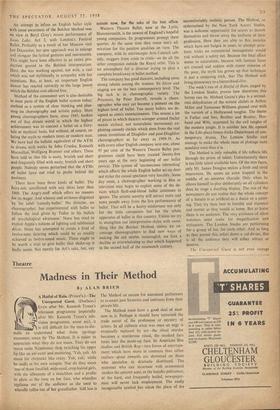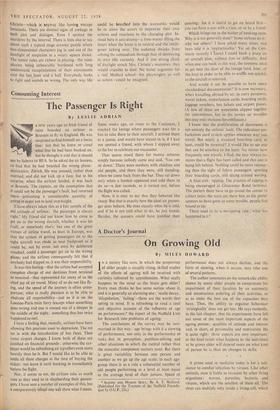Theatre
Madness in Their Method
By ALAN BRIEN A Hatful of Rain. (Prince's.)—The Unexpected Guest. (Duchess.) EVEN after Mr. Kenneth Tynan's television programme (especially after Mr. Kenneth Tynan's tele- vision programme, some say), it is Still difficult for the man-in-the- to understand what those up-stage mummers mean by The Method. It is easier to appreciate what they do not mean. They do not mean some Napoleonic thug twitching his upper lip like an ant-eater and muttering, `Yah, yah. Ah mean for chrissake like crazy. Yah, yah,' while he sniffs at his own armpits. Nor do they mean one of those freckled, wide-eyed, crop-haired girls, with the silhouette of a matchbox and a profile as plain as the nose on her face, who wheedles applause out of the audience as she used to wheedle toffee out of her grandfather. Still less is The Method an excuse for untrained performers to re-enact past hysterics and tantrums from their private life.
The Method must have a good deal of mad- ness in it. Perhaps it should have remained the trade secret of the profession or mystery of actors. In all cultures what was once an orgy is eventually replaced by art—the ritual murder becomes a murderous ritual, the masked face turns into the made-up face. In American film studios and British Rep—two forms of entertain- ment which have more in common than either realises—great rewards are showered on those who specialise in dramatic shorthand. The mummer who can incarnate with economical strokes the spinster aunt, or the bucolic policeman, or the hard, and frequently boiled, newspaper- man will never lack employment. The easily recognisable symbol has taken the place of the Christie—which is anyway like having vintage lemonade. There are distinct signs of corkage in both plot and dialogue. Even I spotted the murderer by the interval. There is little else to say about such a typical stage acrostic puzzle where two-dimensional characters jog in and out of the limelight of suspicion in a weary square dance. The minor roles are richest in playing—the main Players being unbearably burdened with long unidiomatic recapitulations of their movements over the last hour and a half. Everybody looks so right and sounds so wrong. The only way life could be • breathed into the waxworks would be to allow the actors to improvise their own actions and reactions to the changing plot. In- stead here is anti-drama--a time-waster filling the hours when the brain is in neutral and the intelli- gence ticking over. The audience shrinks from solving the conundrum through fear of destroying its own idle curiosity. And if one strong chink of daylight struck Mrs. Christie's mummies, they would crumble to dust. No better argument for a real Method school—for playwrights as well as actors—could be imagined.































 Previous page
Previous page